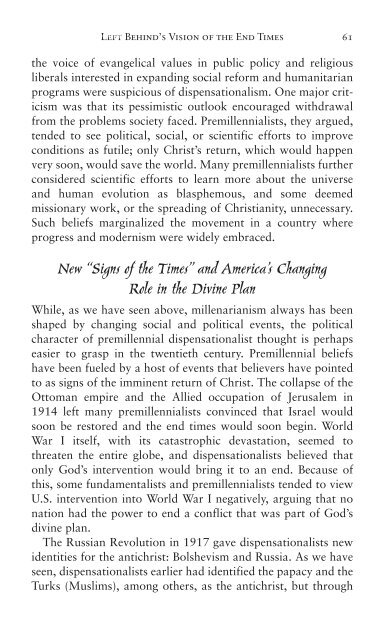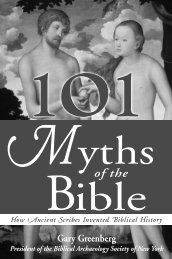Rapture, Revelation, and the End Times - Conscious Evolution TV
Rapture, Revelation, and the End Times - Conscious Evolution TV
Rapture, Revelation, and the End Times - Conscious Evolution TV
Create successful ePaper yourself
Turn your PDF publications into a flip-book with our unique Google optimized e-Paper software.
obin-bobin Left Behind’s Vision of <strong>the</strong> <strong>End</strong> <strong>Times</strong> 61<strong>the</strong> voice of evangelical values in public policy <strong>and</strong> religiousliberals interested in exp<strong>and</strong>ing social reform <strong>and</strong> humanitarianprograms were suspicious of dispensationalism. One major criticismwas that its pessimistic outlook encouraged withdrawalfrom <strong>the</strong> problems society faced. Premillennialists, <strong>the</strong>y argued,tended to see political, social, or scientific efforts to improveconditions as futile; only Christ’s return, which would happenvery soon, would save <strong>the</strong> world. Many premillennialists fur<strong>the</strong>rconsidered scientific efforts to learn more about <strong>the</strong> universe<strong>and</strong> human evolution as blasphemous, <strong>and</strong> some deemedmissionary work, or <strong>the</strong> spreading of Christianity, unnecessary.Such beliefs marginalized <strong>the</strong> movement in a country whereprogress <strong>and</strong> modernism were widely embraced.New “Signs of <strong>the</strong> <strong>Times</strong>” <strong>and</strong> America’s ChangingRole in <strong>the</strong> Divine PlanWhile, as we have seen above, millenarianism always has beenshaped by changing social <strong>and</strong> political events, <strong>the</strong> politicalcharacter of premillennial dispensationalist thought is perhapseasier to grasp in <strong>the</strong> twentieth century. Premillennial beliefshave been fueled by a host of events that believers have pointedto as signs of <strong>the</strong> imminent return of Christ. The collapse of <strong>the</strong>Ottoman empire <strong>and</strong> <strong>the</strong> Allied occupation of Jerusalem in1914 left many premillennialists convinced that Israel wouldsoon be restored <strong>and</strong> <strong>the</strong> end times would soon begin. WorldWar I itself, with its catastrophic devastation, seemed tothreaten <strong>the</strong> entire globe, <strong>and</strong> dispensationalists believed thatonly God’s intervention would bring it to an end. Because ofthis, some fundamentalists <strong>and</strong> premillennialists tended to viewU.S. intervention into World War I negatively, arguing that nonation had <strong>the</strong> power to end a conflict that was part of God’sdivine plan.The Russian Revolution in 1917 gave dispensationalists newidentities for <strong>the</strong> antichrist: Bolshevism <strong>and</strong> Russia. As we haveseen, dispensationalists earlier had identified <strong>the</strong> papacy <strong>and</strong> <strong>the</strong>Turks (Muslims), among o<strong>the</strong>rs, as <strong>the</strong> antichrist, but throughrobin-bobin





